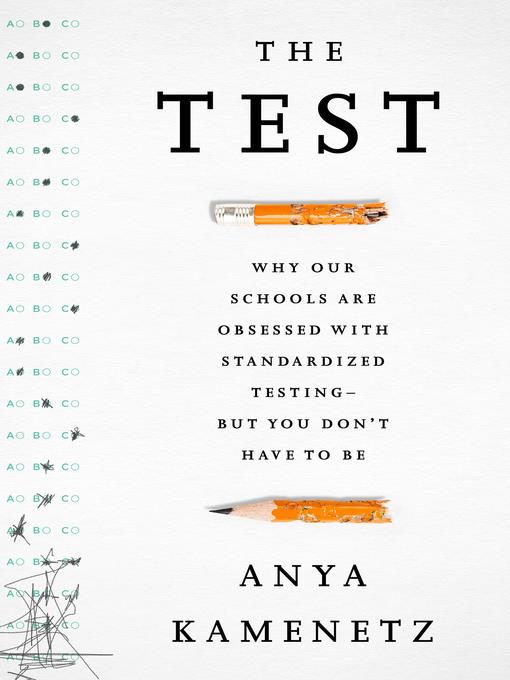
The Test
Why Our Schools are Obsessed with Standardized Testing--But You Don't Have to Be
کتاب های مرتبط
- اطلاعات
- نقد و بررسی
- دیدگاه کاربران
نقد و بررسی

October 27, 2014
The buzzwords and counterarguments of the nationwide testing debate are enough to make any parent’s head spin, and Kamenetz’s book adds to the confusing array as much as it clarifies it. NPR blogger and mother Kamenetz seeks to understand the counterintuitive world of standardized testing, hoping to “resolve a personal dilemma about how to educate child.” She wants her daughter to succeed in school and on tests, but doesn’t want the girl’s creativity and individuality snuffed out by the high-stakes environment. Kamenetz runs readers through a battery of familiar arguments against testing: the tests waste time and money, they make teachers hate teaching, they require teaching to cater to the test, they penalize diversity, and they test the wrong things. She then summarizes the history of testing in the U.S. from 1795 to the present day and digs deep into the business practices that govern current testing systems and policy. As Kamenetz acknowledges, important tests and teacher accountability are not going away, so she offers several strategies to keep students balanced and calm while preparing for such exams, but her suggestions for students and parents, ranging from meditating to opting out, are not always practical. She also devotes considerable discussion to the appealing idea of “game-based” assessments as the future of standardized testing, while admitting that the effectiveness of the approach is still largely unproven. Agent: Jim Levine, Levine Greenberg Rostan Literary Agency.

December 1, 2014
Kamenetz's (lead education blogger, NPR; Generation Debt; DIY U) provocative, well-researched book looks at the $13 billion standardized testing industry. Controlled by a handful of companies, it determines grade promotion and graduation rates and has been shown to discriminate against minorities, the poor, and individuals with learning disabilities. The first part of the work examines frequent complaints: tests emphasize the wrong subjects, waste time and money, and make both teachers and students hate school. Also mentioned is that tests penalize diversity, result in teaching to the test, lead to cheating, and are full of errors. Important historical figures in standardized testing, such as Francis Galton, were undeniably racist, and Kamenetz, along with authors such as Diane Ravitch (The Death and Life of the Great American School System) and Alfie Kohn (The Case Against Standardized Testing), raises many concerns. What will be heartening to the parents and educators who read this book, however, is that Kamenetz doesn't stop there. She offers a range of solutions: opting out of tests, creating better and less frequent exams and testing unconventional but key qualities like mind-set and grit. VERDICT With the Common Core upon us, this timely book should be required reading for anyone concerned with education today.--Elizabeth Safford, Nevins Memorial Lib., Methuen, MA
Copyright 2014 Library Journal, LLC Used with permission.

November 1, 2014
New debates about the worthiness of standardized testing in schools.Beginning with a comprehensive history of standardized testing, NPR education blogger Kamenetz (DIY U: Edupunks, Edupreneurs, and the Coming Transformation of Higher Education, 2010, etc.) shows how this method of analysis morphed into standard practice in the American school system to assess the abilities of students and teachers alike. The author identifies 10 major problems associated with this form of testing, including the fact that these tests analyze the wrong data, waste time and money, put undue stress on students, parents and teachers, cause teaching to the test and disregard the diversity of the test-takers. When the Common Core State Standards initiative takes effect in 2015, American students will be subjected to even more tests, which Kamenetz believes will only exacerbate the problems already identified with this method. Not only are standardized tests asking the wrong questions, but they are being used the wrong way: "as a single, stand-alone measure of the performance of teachers, students, schools, and districts." Using thorough research and illuminating interviews, the author provides readers with effective solutions to implement on both the individual level-opt out of taking standardized tests or work on individual projects that emphasize a variety of skills, not just language arts and math-and the national level, where assessments of student performance should be used for the greater good of the community as well as the individual. With abundant data assembled in an accessible format, the book is a must-read for anyone in the educational system or any parent who has a child old enough to enter preschool. The author amply shows why the current process of evaluation must be upgraded to meet future needs. An informative and enlightening appraisal of the regimented tests that American schoolchildren of all ages are subjected to taking on a regular basis.
COPYRIGHT(2014) Kirkus Reviews, ALL RIGHTS RESERVED.

























دیدگاه کاربران